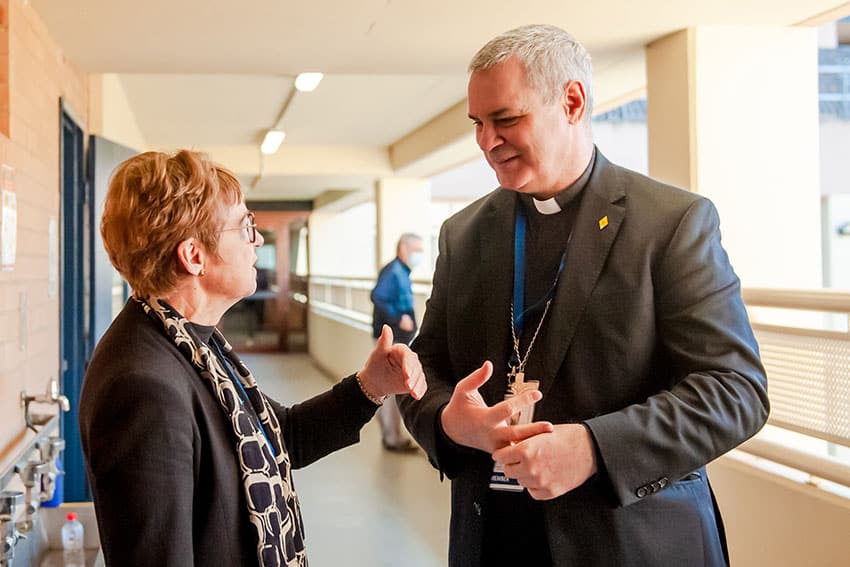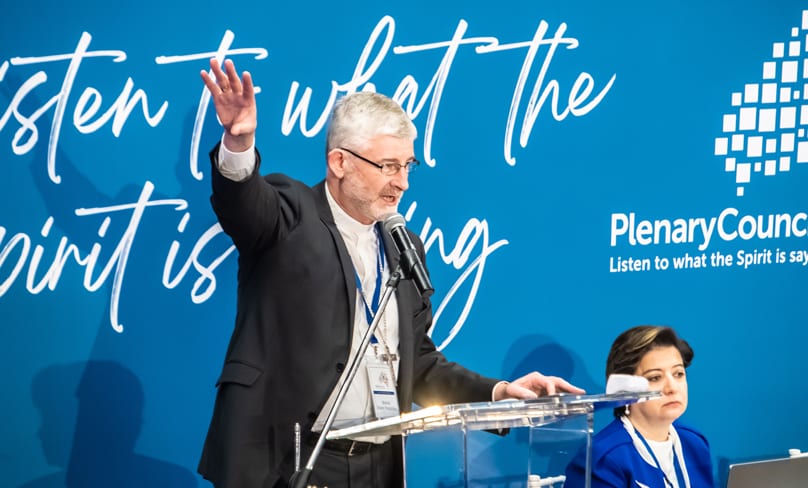
Dr Garry Nolan AM
Some critics of the Plenary’s Second Assembly went too far in their assertions
The opinion piece, ‘The Plenary’s agenda must be exposed – The Catholic Church is Mystical and Life giving by nature, not synodal’ by Sandy Wallace published online on The Catholic Weekly website on 8 July raised many deep concerns.
Sandy’s article is a hard hitting attack on the Plenary Council and on the synodal process. One can understand a level of passion on matters fundamental to our faith.
But the first thing that came to mind on reaching the end of the article was – this fails one of the key teachings of Jesus – “It is by your love for one another, that everyone will recognise you are my disciples.”
“Sandy stated “She [our Church] is not a man made construct open to endless manipulation and change.” But we have been searching for deeper understanding and meaning for over 2000 years.”
The assertion in the article – “The ideological of ‘synodality’, with its roots in subjectivism and Marxism has been imposed” is a significant stretch which is unsubstantiated.
Sandy stated “She [our Church] is not a man made construct open to endless manipulation and change.” But we have been searching for deeper understanding and meaning for over 2000 years.
The debate between Peter and Paul concerning a place for gentiles in our Church was a vigorous struggle and a significant change in understanding and practice.

Sandy goes on to assert that the Plenary Council is not a new interpretation, consistent with the Canon Law or tradition. However, the Vatican authorised the holding of the Plenary Council and how it would operate.
To accept Sandy’s argument, one must accept that the Vatican does not understand Canon Law and Catholic tradition. The Australian Plenary Council has been observed around the world, and I have not seen any comments that support Sandy’s argument.
The article goes on to state – “Christ established the leadership of the Church in the form of 12 Apostles”.
“If male leadership is so rigid, so fundamental a part of the Divine nature of our Church, one would expect Jesus would have stated that – but He did not.”
“This form of leadership was not the product of ‘cultural bias’, or simply the form required by the particular social and historical context, which needs to be ‘reinterpreted’ to remain relevant. No, this structure was put in place by God, it has a Divine mandate, that is not and cannot be limited by cultural or history, it transcends these by its very Divine nature.”
If male leadership is so rigid, so fundamental a part of the Divine nature of our Church, one would expect Jesus would have stated that – but He did not. This obsession with masculinity – with male power over women – is not healthy.
There have been many studies that have provided clear evidence that in social structures where men are seen as having a dominant role over women, domestic violence is prevalent.

No one in our Church would support domestic violence, but we must ask ourselves – are we contributing to domestic violence? The detailed research on this complex issue would suggest – Yes.
What is most probable is that what was occurring over 2000 years ago with the 12 Apostles being men, was just following the cultural practice of the day.
More significantly, we need to ask – if men are the centre point of our Church, why would Jesus have allowed a woman to be the first witness to His Resurrection?
“Working through God, anyone who understands leadership knows that the authority of any leader comes from the people he/she leads.”
Nothing under consideration at the Plenary Council suggested taking away the leadership role of the bishops. What was suggested was drawing on the very considerable talents of the baptised to support the bishops.
The ultimate authority for all in the Church comes from God. Working through God, anyone who understands leadership knows that the authority of any leader comes from the people he/she leads.
There are many things that have happened in the history of our Church that we are not proud of. But the child sexual abuse issue must be the worst of them all.

What would Jesus say about these horrible, evil acts that occurred and were allowed to continue? The harsh reality is that if the dioceses where child sexual abuse was being committed had a Diocesan Pastoral Council and, a mother was on the council, or someone concerned with pastoral care, the systemic nature of this terrible, evil action would have been stopped much earlier.
Sandy wrote “The reality of this underlying disease of the ‘synodal’ approach” and “The very nature of what has taken place under the guise of a ‘Plenary Council’ can be considered nothing less than an offense to God that itself requires acts of penance.”
Disease is a very strong attack, but what is a synodal approach? At its core is collaboration and discernment. The preparation for the Plenary Council included Listening and Dialogue sessions, submissions and a Listening and Discernment phase. How can that be a “disease”, how would that be “an offense to God”?
“There is no longer Jew or Greek, there is no longer slave or free, there is no longer male and female; for all of you are one in Christ Jesus”.
In our Catholic tradition, God has revealed a great deal to us through the saints – men and women, many of whom were not successors to the 12. It is now well accepted that any decision making body will make better decisions if the input to the decision making process comes from a wide diversity of people. The Plenary Council called on the Holy Spirit for guidance and it was clear that something holy and spiritual was taken to the Council by the wonderful women who were present.
The final word here must come from scripture in St Paul’s words in Galatians (3:28) – “There is no longer Jew or Greek, there is no longer slave or free, there is no longer male and female; for all of you are one in Christ Jesus”.
The article goes on to state – “It is not an overstatement to say that the faith of many is placed in jeopardy by the continuation of what can best be described as a parody of a properly constituted Plenary Council of the Catholic Church, which threatens to fundamental change the way in which the Church is governed in Australia.”

However, the faith of many was placed in jeopardy by the significant governance failures in our Church.
As we sadly know, in the order of 92 per cent of Catholics in Australia no longer attend Mass on a regular basis. When one discusses this disturbing statistic with various bishops, the response is often that we now live in a more secular and pluralistic society – external reasons.
But when one discusses this matter with the Catholics concerned, the initial response is often superficial, but as the discussion continues – the reasons are always internal.
‘I did not leave the Church, the Church left me’ is an expression we hear often. Yet many of the 92 per cent are still active in Catholic Social Service agencies. Here they see a reflection of Jesus every day, and this is, for them, ‘the true Church’.
“The Plenary Council may not have been perfect, but it was … a genuine attempt to address these issues.”
Bishop Eugene Hurley articulated our current position clearly in 2013 when he quoted the findings from a United States research study which found that when people were asked to respond spontaneously to the term ‘Jesus’, they responded “compassionate”, “cares for the poor”, “forgiving of sinners”, “loving”.
But when asked to respond to the word ‘Church’, they responded “irrelevant”, “negative”, “out of touch”, “powerful”, “lacking in understanding of ordinary people’s lives”.
The Plenary Council may not have been perfect, but it was, I believe, a genuine attempt to address these issues.
It is clear that considerable change is necessary in our Church to take us from where we are today to where God is asking us to be in Australia at this time.
Dr Garry Nolan AM is a life-long lay Catholic who has been active in Catholic schools, parishes, deaneries, Catholic social services agencies, and has extensive experience in governance, leadership mentoring and community& organisational development.
Related Articles:
